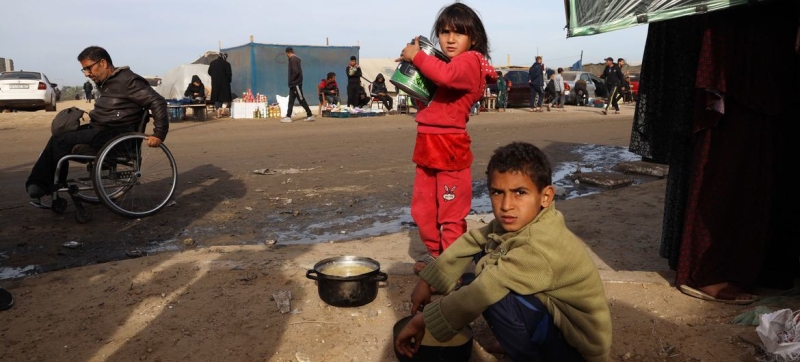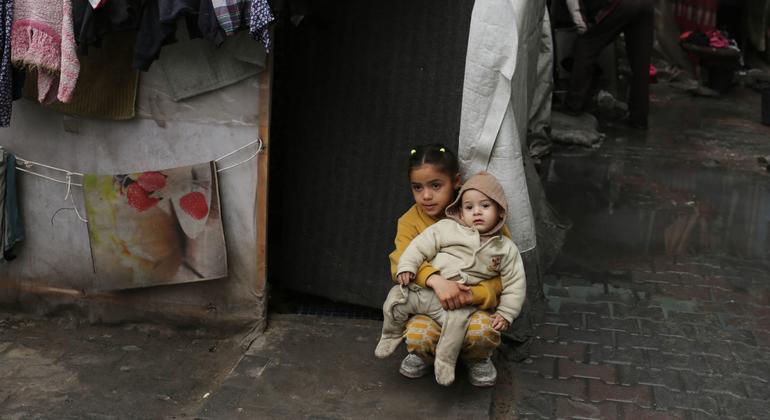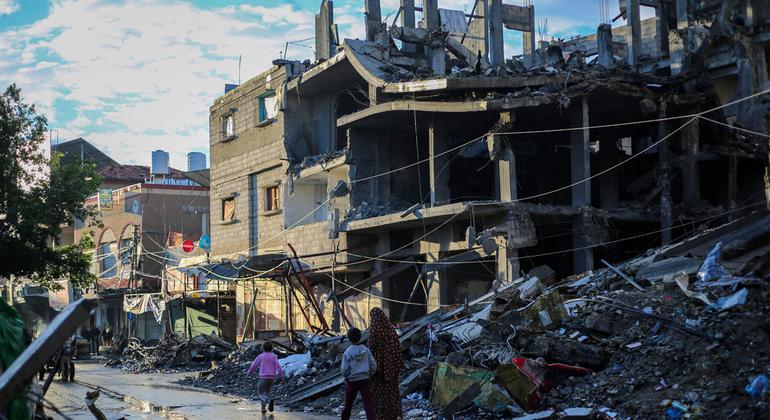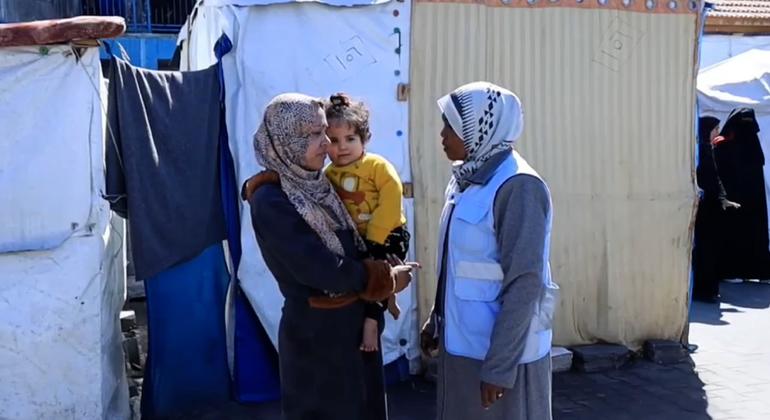
Children living in tents in Rafah struggle to find food. UN: Gazans face massive famine, but it can still be prevented Humanitarian assistance
A situation of mass famine may await Gaza in the near future. This is stated in the new report of the Integrated Classification of Food Security Phases (IFS).
According to the Food and Agriculture Organization (FAO), mass famine may be declared in the northern provinces until May this year.
“Palestinians in Gaza are suffering from terrible hunger and deprivation,” UN Secretary-General Antonio Guterres commented on the new data. “This is the largest number of people facing catastrophic hunger ever recorded anywhere by the Integrated Food Security Phase Classification.”
The report shows that , that the crisis can be stopped, and this requires an immediate humanitarian ceasefire.
The UN chief called on the Israeli authorities to ensure full and unhindered access to assistance throughout Gaza. He also appealed to the international community to support humanitarian efforts and prevent an “unthinkable” catastrophe.

Meanwhile, the Director-General of the World Health Organization (WHO), Tedros Adhanom Ghebreyesus, said in connection with the storming of Al-Shifa Hospital by the Israeli military on Monday that medical institutions should never become a battlefield.
The lives of staff, patients and other civilians are at stake, the WHO chief warned, adding that “minimal” medical services had only recently resumed at Al Shifa.
Integrated Phase Classification
ICF forecasts are compiled from on-the-ground assessments, which are then used by aid workers to distribute aid to affected people the greatest risk.
The latest figures indicate that Gaza’s entire population – some 2.3 million people – is suffering from “severe” food shortages. This includes 1.11 million people suffering from “catastrophic” food insecurity – this is Phase 5 according to the classification.
Without a ceasefire, mass famine is inevitable
Food shortages have worsened in the sector since the previous analysis, which was conducted in December, with an estimated 79 percent more Gazans facing catastrophic levels of hunger from mid-February to mid-March. and a 92 percent increase is forecast between now and July.
Read also:
Chief UN human rights activist: mass famine in Gaza cannot be allowed
“Unless steps are taken to end the fighting and expand access to humanitarian assistance, widespread famine will be inevitable,” said FAO Deputy Director-General Beth Bechdol.
Days without food
The report notes that virtually all families in Gaza now skip meals every day . In particular, adults refuse food to feed their children.
“In the northern provinces, nearly two-thirds of households have gone an entire day without food at least 10 times in the past 30 days,” FAO said, adding that in the north of the sector, every third child under the age of two suffers from acute malnutrition.
Invasion in Rafah
In the past weekend, the head of the WHO expressed serious concern that Israel continues to prepare a ground offensive on Rafah, where more than a million people are taking refuge.
“Further escalation of violence in this densely populated area will lead to more death and suffering, especially as health facilities are already overwhelmed,” Tedros said.
People in Rafah have nowhere to run, he said, and many are too weak, hungry and sick to evacuate.

“In the name of humanity, we call on Israel not to carry out its plans and instead work towards peace,” said the head of the WHO.
An Israeli delegation belatedly traveled to Qatar on Monday to participate in ongoing negotiations for a ceasefire and the release of hostages captured during the Oct. 7 Hamas attacks in Israel that killed about 1,200 people.
Agricultural supplies
FAO noted that hostilities lead to the cessation of supplies of water, food and fuel. The UN agency also reports the collapse of all sectors related to food production.
60 to 70 percent of Gaza’s livestock were either killed or slaughtered prematurely to meet critical food needs resulting from the conflict.
To help Gazans, FAO has mobilized efforts to ensure essential agricultural supplies reach the sector as soon as conditions allow. The organization said its first priority is the delivery of animal feed, including 1,500 tons of barley.
With the distribution of barley, all children under 10 in Gaza will be able to receive milk, giving them about 20 percent of their recommended calories, according to the FAO.
Help the victims
According to Gaza health authorities, since the start of hostilities in the strip, 31,726 people have been killed and 73,792 injured.
At the same time, the United Nations Children’s Fund (UNICEF) warns that life-threatening malnutrition is reaching unprecedented levels due to the effects of war and restrictions on aid delivery.
UN Under-Secretary-General for Humanitarian Affairs and UN Emergency Relief Coordinator Martin Griffiths told a humanitarian forum in Brussels on Monday that during the Gaza war the world body was being hampered in its work and then criticized for not doing enough.

During the same meeting, UN Palestine Refugee Agency (UNRWA) representative Nathalie Boucley stressed that UNRWA plays a key role in providing humanitarian assistance in the enclave. She said the agency continues to work with partners, including UNICEF, which has vaccinated 53,000 children in UNRWA shelters since January.
“Political will is required to open more checkpoints to receive aid and distribute it throughout Gaza. We need a ceasefire,” Boukli said.
She noted that in the current situation, work is extremely difficult, and only about 99 trucks a day are arriving in Gaza.
“All restrictions related to receiving assistance must be lifted, and we also need more stable communications and the Internet, which are currently disrupted,” the UNRWA representative emphasized.
